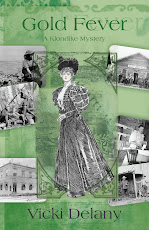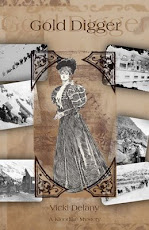

The Promised Land. Not.
In her book Gold Diggers (a non-fiction account of the Klondike Gold Rush) Charlotte Gray points out that the rush was largely a journalistic or media event.
That there was gold in the Yukon was not exactly a big secret. People had been mining there and finding gold for more than twenty years. So what happened in 1897 that set off a world wide rush that saw tens of thousands, probably hundreds of thousands, of people from all parts of the world packing up all their worldly belongings and rushing into the wilderness?
Media.

There was a severe depression going on in the United States. When word arrived that a ship was heading to Seattle, carrying gold and now-rich gold miners, the newspapers, particularly the Seattle Post-Intelligencer and Seattle Times, saw the opportunity to pump up the business prospects of Seattle. And they played it up for all it was worth. They made the arrival of the Portland in July 16, 1897 into a media event of unprecedented proportions. Other papers, of course, picked it up, and the news spread to a highly receptive audience like wildfire.
The amount of gold in that first shipment wasn’t really all that impressive. The papers reported it in weight – which did sound pretty good – rather than value – nothing too special.
Once the story had legs, as they say in the newspaper biz, everyone else was jumping on the bandwagon. Outfitting shops sprouted overnight, stores put ads in newspapers and hung signs and banners, books and maps were printed by the boatload, and everyone with a boat rushed to the docks to provide transportation. That the books and maps were likely to be laughably inaccurate, and the goods one supposedly needed wouldn’t do much other than take money from a wanna-be prospector’s pocket, was of no relevance. People needed to believe and other people were happy to take advantage of that need.
Unfortunately for the tens of thousands who made it to the Klondike, the reality was a lot different. There wasn't gold lying on the ground waiting to be swept up, and the profitable mines were already owned by those who’d been in the area when the strike happened.
The only real money to be made was in the shops or the saloons and dance halls.
Enter Fiona MacGillivray.













No comments:
Post a Comment